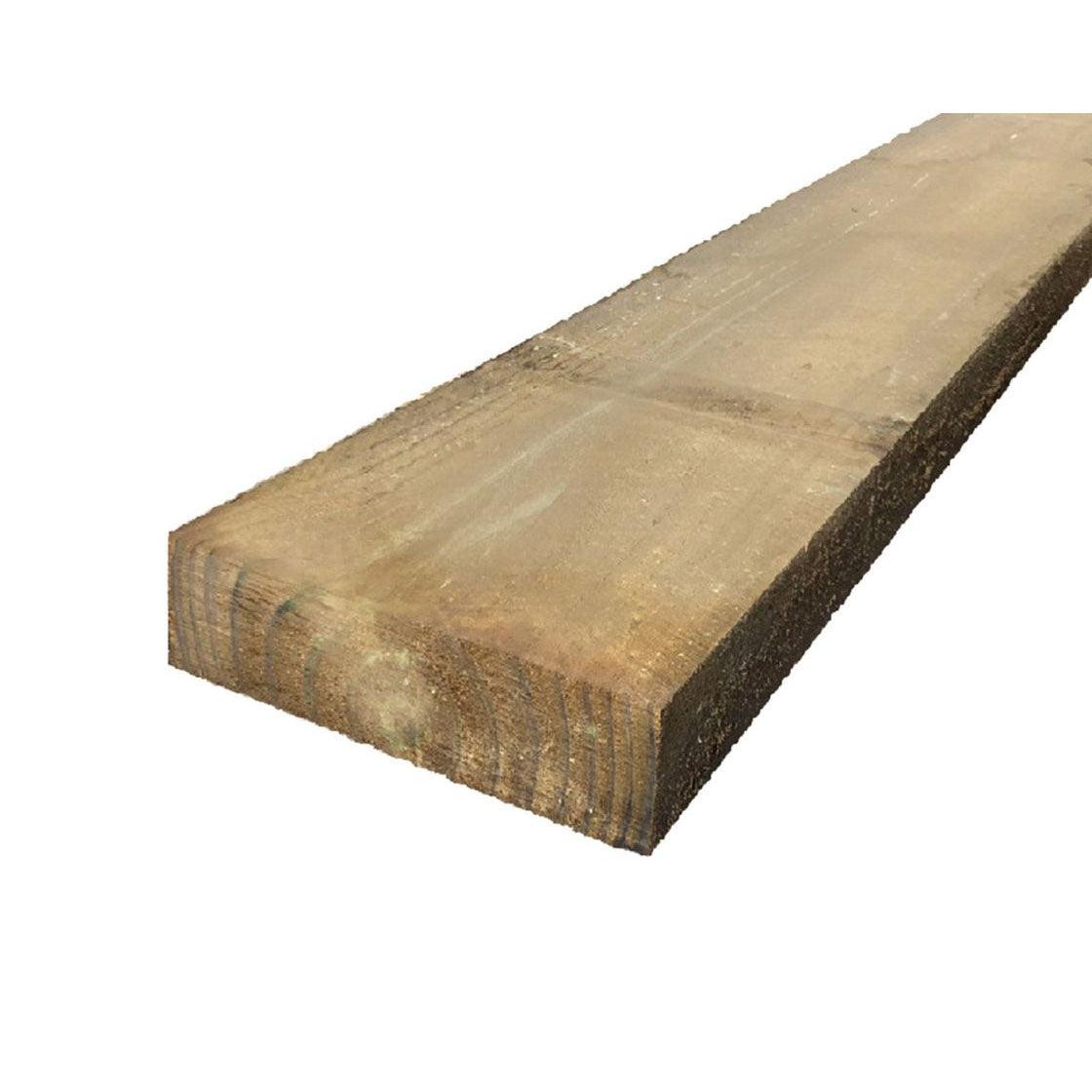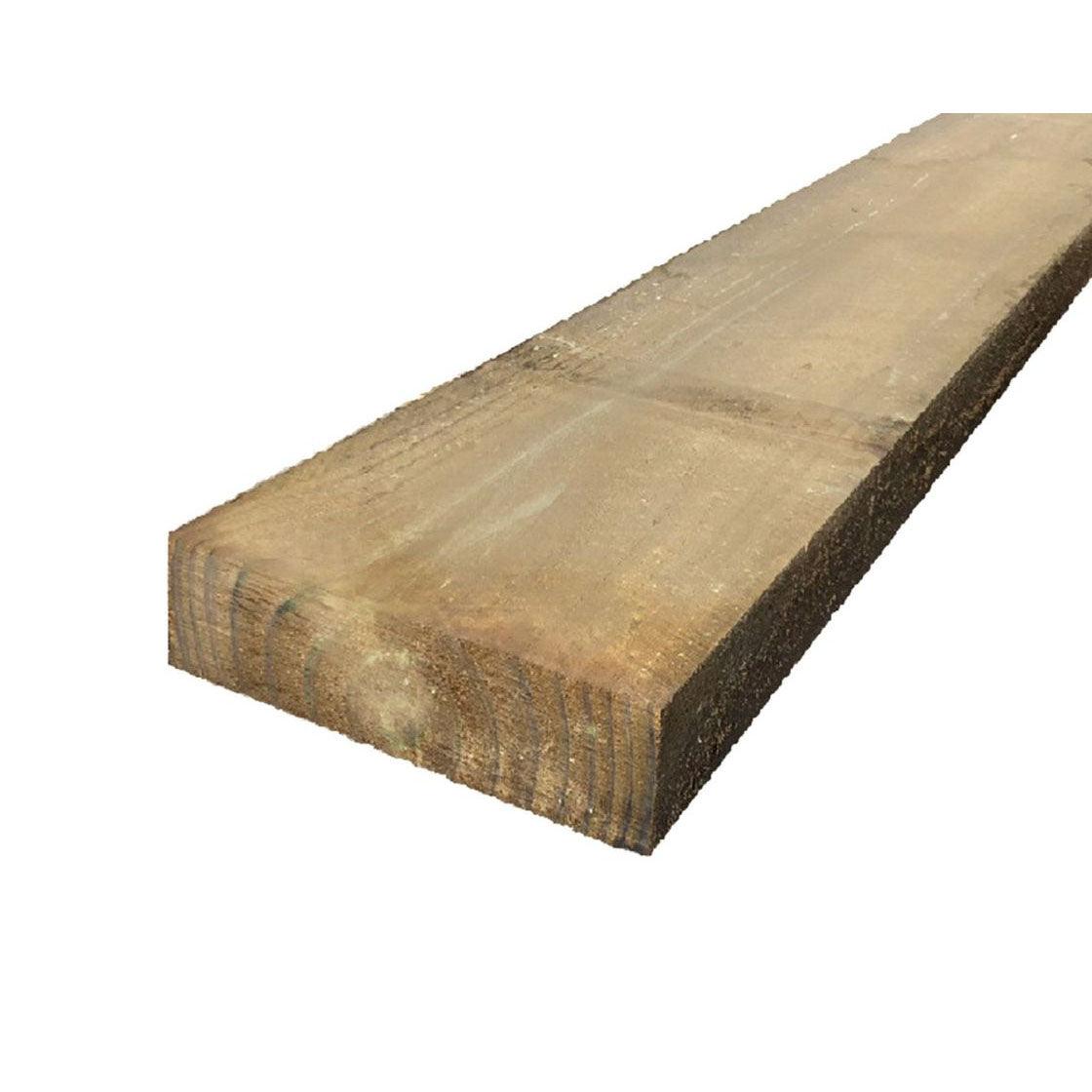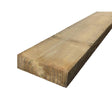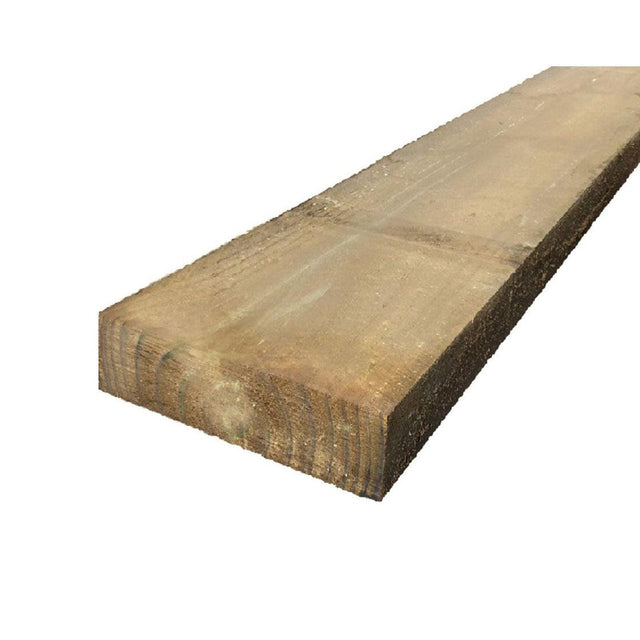Treated Pine Sleepers 200 x 50mm - H4
Treated Pine Sleepers 200 x 50mm - H4 - 2400mm
Couldn't load pickup availability
Description
Description
Key Features:
- Material: Crafted from Plantation Softwood Radiata Pine, these treated pine sleepers are both durable and sustainably sourced, perfect for various landscaping timber applications.
- Treatment Standards: Treated in accordance with Australian Standards AS/NZS 1604, ensuring top-notch quality and safety for retaining wall sleepers and other uses.
- Hazard Class: Featuring an H4 Hazard Class Treatment Level, making them robust and suitable for demanding outdoor and in-ground applications like garden bed sleepers.
- Protection: These sleepers are well-protected against insects, termites, and decay, enhancing their longevity and performance in various environmental conditions. Ideal for treated pine retaining walls.
- Design: Rough sawn timber provides a natural and rustic appearance, supplied in set lengths for consistency and ease of use. This aesthetic flexibility makes them suitable for a variety of timber landscaping projects.
- Versatility: Ideal for use in treated pine fencing and retaining walls, offering both functionality and aesthetic appeal. These sleepers are also excellent for raised garden beds and other DIY landscaping projects.
Opt for our Treated Pine Sleepers for your next landscaping project to ensure a blend of durability, protection, and natural beauty. Perfect for building garden beds, retaining walls, and other landscaping features.
All You Need to Know About Treated Pine Sleepers
Quality and Longevity
Do Treated Pine Sleepers Vary in Quality?
Do Treated Pine Sleepers Vary in Quality?
Yes, treated pine sleepers vary in quality. At Australian Treated Pine, we produce only high-quality sleepers that are H4 rated, suitable for external in-ground use.
How Long Do Treated Pine Sleepers Last?
How Long Do Treated Pine Sleepers Last?
When used correctly, treated pine sleepers can last up to 20 years.
Will Treated Pine Crack And Split?
Will Treated Pine Crack And Split?
Like all timber, treated pine is a natural product and can be prone to surface cracking and splitting, especially when fully exposed to the weather. To minimize the effects of weathering, we recommend applying a high-quality oil.
Types of Treated Pine
What Does Wet Treated Pine Sleepers Mean?
What Does Wet Treated Pine Sleepers Mean?
Wet treated pine sleepers are a cost-effective, non-structural product ideal for garden edging, fencing, baseboards, and other outdoor uses. Although they are treated for outdoor use, they have not been kiln-dried or structurally graded.
What Is CCA Treated Pine?
What Is CCA Treated Pine?
CCA treated pine is timber that has been pressure treated with a preservative containing copper, chromium, and arsenic (CCA) according to Australian Standards. This treatment protects the timber from termite infestation and decay caused by fungi.
Is CCA Treated Pine Safe?
Is CCA Treated Pine Safe?
CCA treated pine is safe to use in typical building projects and household environments. It is recommended to follow standard safety precautions, such as wearing a dust mask and protective gloves, but no special measures are necessary. You can saw, drill, plane, and paint treated timber without concern.
What is ACQ Treated Pine?
What is ACQ Treated Pine?
Alkaline Copper Quaternary (ACQ) is a water-based wood preservative method that has been recently introduced in countries seeking alternatives to copper, chromium, and arsenic (CCA) treatments.
Is ACQ Treated Pine Safe?
Is ACQ Treated Pine Safe?
ACQ treated pine is safe because it does not contain arsenic or chromium. This makes it ideal for use in building raised garden beds, outdoor furniture, and playgrounds.
Usage and Applications
How to build a retaining wall out of sleepers?
How to build a retaining wall out of sleepers?
Sleepers are a popular choice for building retaining walls. To construct a retaining wall with sleepers, ensure that the posts are properly installed in the foundations at the correct intervals. This is essential for the retaining wall to support the weight of the soil behind it. H4 or higher treated pine sleepers are recommended for wet and damp environments to prevent rot and decay.
Is H4 treated pine safe for vegetable gardens?
Is H4 treated pine safe for vegetable gardens?
H4 treated pine is safe for vegetable gardens. Our ACQ treated pine does not contain arsenic, ensuring it won't affect your health. However, it's important to choose materials that you feel comfortable with. There are many other options available at landscapesupply to suit your preferences.
What is the difference between H3 and H4 treated pine?
What is the difference between H3 and H4 treated pine?
H3 treated pine is suitable for off-the-ground applications, while H4 treated pine is designed for use in contact with the ground and in potentially wet or damp environments. For ground-level installations, it's best to use H4 sleepers to ensure durability and longevity.
Costs and Considerations
How much do garden sleepers cost?
How much do garden sleepers cost?
The cost of a garden sleeper varies depending on the type of wood, size, treatment type (such as CCA or ACQ), and the supplier. On average, garden sleepers range from $14 to $60, depending on these factors.
What do you look for while choosing the treated pine sleepers for retaining walls?
What do you look for while choosing the treated pine sleepers for retaining walls?
When choosing treated pine sleepers for retaining walls, consider the following:
1. Correct Size: Select the appropriate size based on the distance between the supporting posts and the height of the wall. The higher the wall and the further apart the posts, the thicker the sleeper should be.
2. Straightness: Opt for sleepers that are as straight as possible. This will make the construction process easier and result in a better-looking finish.
Protection and Maintenance
Will termites eat Treated Pine Sleeper?
Will termites eat Treated Pine Sleeper?
Termites are less likely to eat treated pine sleepers because they are permeated with a chemical solution that resists decay, infestations, and other deteriorating effects. However, treated pine sleepers are not completely immune to termites, so it's important to seal them with a good quality oil for added protection.




